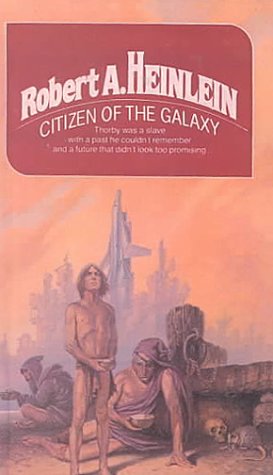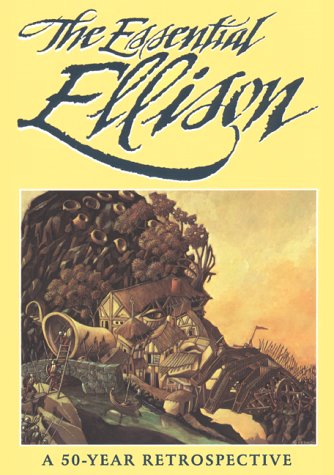Defining works of classical science fiction
Explore the defining works of classical science fiction with our curated list of must-read books. Discover iconic titles that shaped the genre and inspired generations of sci-fi enthusiasts.

Book
More Than Human
by Theodore Sturgeon
In this genre-bending novel—among the first to have launched sci-fi into the arena of literature—one of the great imaginers of the twentieth century tells a story as mind-blowing as any controlled substance and as affecting as a glimpse into a stranger's soul. There's Lone, the simpleton who can hear other people's thoughts and make a man blow his brains out just by looking at him. There's Janie, who moves things without touching them, and there are the teleporting twins, who can travel ten feet or ten miles. There's Baby, who invented an antigravity engine while still in the cradle, and Gerry, who has everything it takes to run the world except for a conscience. Separately, they are talented freaks. Together, they compose a single organism that may represent the next step in evolution, and the final chapter in the history of the human race. As the protagonists of More Than Human struggle to find out who they are and whether they are meant to help humanity or destroy it, Theodore Sturgeon explores questions of power and morality, individuality and belonging, with suspense, pathos, and a lyricism rarely seen in science fiction. Winner of the Hugo, Nebula, and International Fantasy Awards

Book
The Stars My Destination
by Alfred Bester
In this pulse-quickening novel, Alfred Bester imagines a future in which people "jaunte" a thousand miles with a single thought, where the rich barricade themselves in labyrinths and protect themselves with radioactive hit men--and where an inarticulate outcast is the most valuable and dangerous man alive.


Book
The Martian Chronicles
by Ray Bradbury
Man, was a a distant shore, and the men spread upon it in wave... Each wave different, and each wave stronger. The Martian Chronicles Ray Bradbury is a storyteller without peer, a poet of the possible, and, indisputably, one of America's most beloved authors. In a much celebrated literary career that has spanned six decades, he has produced an astonishing body of work: unforgettable novels, including Fahrenheit 451 and Something Wicked This Way Comes; essays, theatrical works, screenplays and teleplays; The Illustrated Mein, Dandelion Wine, The October Country, and numerous other superb short story collections. But of all the dazzling stars in the vast Bradbury universe, none shines more luminous than these masterful chronicles of Earth's settlement of the fourth world from the sun. Bradbury's Mars is a place of hope, dreams and metaphor-of crystal pillars and fossil seas-where a fine dust settles on the great, empty cities of a silently destroyed civilization. It is here the invaders have come to despoil and commercialize, to grow and to learn -first a trickle, then a torrent, rushing from a world with no future toward a promise of tomorrow. The Earthman conquers Mars ... and then is conquered by it, lulled by dangerous lies of comfort and familiarity, and enchanted by the lingering glamour of an ancient, mysterious native race. Ray Bradbury's The Martian Chronicles is a classic work of twentieth-century literature whose extraordinary power and imagination remain undimmed by time's passage. In connected, chronological stories, a true grandmaster once again enthralls, delights and challenges us with his vision and his heart-starkly and stunningly exposing in brilliant spacelight our strength, our weakness, our folly, and our poignant humanity on a strange and breathtaking world where humanity does not belong.

Book
The Man in the High Castle
by Philip K. Dick
It's America in 1962. Slavery is legal once again. the few Jews who still survive hide under assumed names. In San Francisco the I Ching is as common as the Yellow Pages. All because some 20 years earlier the United States lost a war--and is now occupied jointly by Nazi Germany and Japan. This harrowing, Hugo Award-winning novel is the work that established Philip K. Dick as an innovator in science fiction while breaking the barrier between science fiction and the serious novel of ideas. In it Dick offers a haunting vision of history as a nightmare from which it may just be possible to awake.


Book
The Female Man
by Joanna Russ
Living in an altered past that never saw the end of the Great Depression, Jeannine, a librarian, is waiting to be married. Joanna lives in a different version of reality: she's a 1970s feminist trying to succeed in a man's world. Janet is from Whileaway, a utopian earth where only women exist. And Jael is a warrior with steel teeth and catlike retractable claws, from an earth with separate-and warring-female and male societies. When these four women meet, the results are startling, outrageous, and subversive.

Book
The Left Hand of Darkness
by Ursula K. Le Guin
50TH ANNIVERSARY EDITION—WITH A NEW INTRODUCTION BY DAVID MITCHELL AND A NEW AFTERWORD BY CHARLIE JANE ANDERS Ursula K. Le Guin’s groundbreaking work of science fiction—winner of the Hugo and Nebula Awards. A lone human ambassador is sent to the icebound planet of Winter, a world without sexual prejudice, where the inhabitants’ gender is fluid. His goal is to facilitate Winter’s inclusion in a growing intergalactic civilization. But to do so he must bridge the gulf between his own views and those of the strange, intriguing culture he encounters... Embracing the aspects of psychology, society, and human emotion on an alien world, The Left Hand of Darkness stands as a landmark achievement in the annals of intellectual science fiction.

Book
Planet of Adventure
by Jack Vance
Together for the first time in one omnibus edition--City of the Chasch, Servants of the Wankh, The Dirdir, and The Pnume. Award-winning author Vance's exotic and complex world is filled with baroque landscapes, dastardly villains and warring aliens--all served up with grace and wonder.

Book
A Case of Conscience
by James Blish
Winner of the Hugo Award • The future of Earth will rely upon one man’s sense of right and wrong. . . . Father Ruiz-Sanchez is a dedicated man—a priest who is also a scientist, and a scientist who is also a human being. He has found no insoluble conflicts in his beliefs or his ethics . . . until he is sent to Lithia. There he comes upon a race of aliens who are admirable in every way except for their total reliance on cold reason; they are incapable of faith or belief. Confronted with a profound scientific riddle and ethical quandary, Father Ruiz-Sanchez soon finds himself torn between the teachings of his faith, the teachings of his science, and the inner promptings of his humanity. There is only one solution: He must accept an ancient and unforgivable heresy—and risk the futures of both worlds . . .


Book
Earth Abides
by George R. Stewart
A disease of unparalleled destructive force has sprung up almost simultaneously in every corner of the globe, all but destroying the human race. One survivor, strangely immune to the effects of the epidemic, ventures forward to experience a world without man. What he ultimately discovers will prove far more astonishing than anything he'd either dreaded or hoped for.



Book
The Ascent of Wonder
by David G. Hartwell
Featuring more than sixty groundbreaking short stories by modern science fiction's most important and influential writers, The Ascent of Wonder offers a definitive and incisive exploration of the SF genre's visionary core. From Poe to Pohl, Wells to Wolfe, and Verne to Vinge, this hefty anthology fully charts the themes, trends, thoughts, and traditions that comprise the challenging yet rich literary form known as "hard SF."